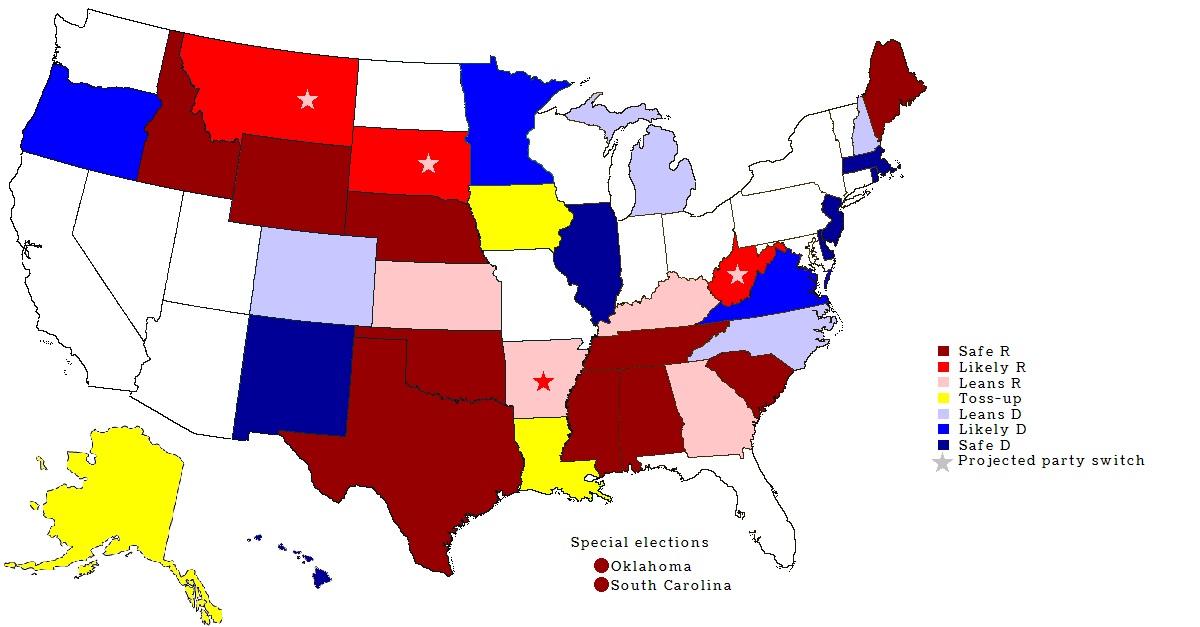This week three major statistical models all showed Republican chances of taking the Senate declining significantly.
Videos by Rare
FiveThirtyEight has lowered its odds of a Republican Senate from 64% to 53% in the past two weeks. “Leo,” the New York Times model, has had Republican odds ahead since June, but now shows a 50-50 race. The Washington Post’s Election Lab gave Democrats a 51% chance of holding the Senate yesterday.
Republicans were back up to 50.1% odds in Election Lab when the latest polling was factored in later, but the point is that all three models show a race for the Senate that has gone from GOP-leaning to a coin flip.
What’s going on?
Part of it can be attributed to Kansas, where the Democratic candidate withdrew to leave an independent candidate in a competitive race with the incumbent Republican. But that doesn’t explain why Democrats have been gaining elsewhere.
A new report by the Wesleyan Media Project provides a partial explanation: Advertising.
The data from Wesleyan shows that in key Senate races, Democrats are airing more ads than Republicans. (The opposite is true for gubernatorial races.) Sean Trende of RealClearPolitics comments that if you look at Wesleyan’s maps of where ads are airing, “the polling trends we’ve seen make an awful lot more sense.” And Harry Enten of FiveThirtyEight writes:
Three of [Democrats’] larger advertising leads have been in Colorado, Michigan and North Carolina — the three states where we’ve seen the biggest movements toward Democratic candidates in the FiveThirtyEight forecasts. New Hampshire, one of the few competitive states to move toward the GOP over the last week, is also one of the few states where Republicans have had an advertising advantage.
The air war is an artifact of the money race, of course, and Charlie Cook is hearing grumbling from Republicans about their financial disadvantage:
Perhaps the biggest untold story of this election is how so many Republican and conservative donors, at least those whose last name isn’t Koch, have kept their checkbooks relatively closed. In many cases, GOP candidates are not enjoying nearly the same financial largesse that existed in 2012, and in some races, they are well behind Democrats. While Republican candidates, national party committees, and super PACs are hardly starving, their Senate and House campaign committees have not been able to keep pace in fundraising with their Democratic counterparts. Their super PACs do not have nearly the funding that they had in 2012 (even allowing for the absence of a presidential race this year). And, in a number of key races, Democratic candidates, party committees, and their allied groups have been on the air significantly more than Republicans. GOP strategists have privately said that if it were not for spending by organizations affiliated with the Koch brothers, they might well be in really bad shape.
The Wesleyan report shows that ads this cycle have been especially negative, moreso than in 2012 or 2010. Democrats are attacking loudly in a bid to drive up Republican challengers’ unfavorable ratings. Without an equally loud GOP response in most states, the strategy is working.
The trend is particularly pronounced in Colorado and North Carolina, where the incumbent Democrats — Mark Udall and Kay Hagan, respectively — have led in every poll this month (and there have been a raft of them). Both states move from Toss-up to Leans Democrat in our ratings today.
This doesn’t mean that Republicans can’t win those races. And it’s no stretch at all to think that Republicans will win two out of three of the remaining toss-ups on our map, which would get them to 51 seats. But if there are GOP donors who are still considering opening their wallets, now is the time.



